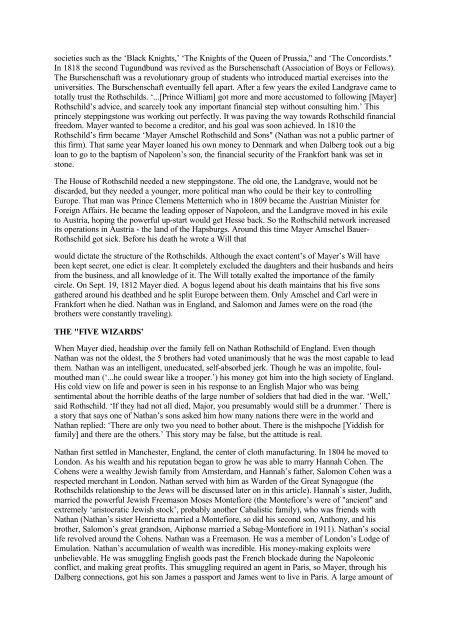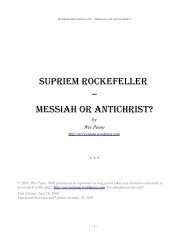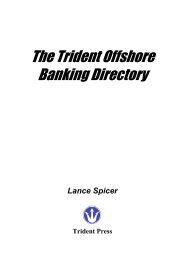Bloodlines of Illuminati
Bloodlines of The Illuminati - S pirit S elf
Bloodlines of The Illuminati - S pirit S elf
- No tags were found...
You also want an ePaper? Increase the reach of your titles
YUMPU automatically turns print PDFs into web optimized ePapers that Google loves.
societies such as the ‘Black Knights,’ ‘The Knights <strong>of</strong> the Queen <strong>of</strong> Prussia," and ‘The Concordists."<br />
In 1818 the second Tugundbund was revived as the Burschenschaft (Association <strong>of</strong> Boys or Fellows).<br />
The Burschenschaft was a revolutionary group <strong>of</strong> students who introduced martial exercises into the<br />
universities. The Burschenschaft eventually fell apart. After a few years the exiled Landgrave came to<br />
totally trust the Rothschilds. ‘...[Prince William] got more and more accustomed to following [Mayer]<br />
Rothschild’s advice, and scarcely took any important financial step without consulting him.’ This<br />
princely steppingstone was working out perfectly. It was paving the way towards Rothschild financial<br />
freedom. Mayer wanted to become a creditor, and his goal was soon achieved. In 1810 the<br />
Rothschild’s firm became ‘Mayer Amschel Rothschild and Sons" (Nathan was not a public partner <strong>of</strong><br />
this firm). That same year Mayer loaned his own money to Denmark and when Dalberg took out a big<br />
loan to go to the baptism <strong>of</strong> Napoleon’s son, the financial security <strong>of</strong> the Frankfort bank was set in<br />
stone.<br />
The House <strong>of</strong> Rothschild needed a new steppingstone. The old one, the Landgrave, would not be<br />
discarded, but they needed a younger, more political man who could be their key to controlling<br />
Europe. That man was Prince Clemens Metternich who in 1809 became the Austrian Minister for<br />
Foreign Affairs. He became the leading opposer <strong>of</strong> Napoleon, and the Landgrave moved in his exile<br />
to Austria, hoping the powerful up-start would get Hesse back. So the Rothschild network increased<br />
its operations in Austria - the land <strong>of</strong> the Hapsburgs. Around this time Mayer Amschel Bauer-<br />
Rothschild got sick. Before his death he wrote a Will that<br />
would dictate the structure <strong>of</strong> the Rothschilds. Although the exact content’s <strong>of</strong> Mayer’s Will have<br />
been kept secret, one edict is clear. It completely excluded the daughters and their husbands and heirs<br />
from the business, and all knowledge <strong>of</strong> it. The Will totally exalted the importance <strong>of</strong> the family<br />
circle. On Sept. 19, 1812 Mayer died. A bogus legend about his death maintains that his five sons<br />
gathered around his deathbed and he split Europe between them. Only Amschel and Carl were in<br />
Frankfort when he died. Nathan was in England, and Salomon and James were on the road (the<br />
brothers were constantly traveling).<br />
THE "FIVE WIZARDS’<br />
When Mayer died, headship over the family fell on Nathan Rothschild <strong>of</strong> England. Even though<br />
Nathan was not the oldest, the 5 brothers had voted unanimously that he was the most capable to lead<br />
them. Nathan was an intelligent, uneducated, self-absorbed jerk. Though he was an impolite, foulmouthed<br />
man (‘...he could swear like a trooper.’) his money got him into the high society <strong>of</strong> England.<br />
His cold view on life and power is seen in his response to an English Major who was being<br />
sentimental about the horrible deaths <strong>of</strong> the large number <strong>of</strong> soldiers that had died in the war. ‘Well,’<br />
said Rothschild. ‘If they had not all died, Major, you presumably would still be a drummer.’ There is<br />
a story that says one <strong>of</strong> Nathan’s sons asked him how many nations there were in the world and<br />
Nathan replied: ‘There are only two you need to bother about. There is the mishpoche [Yiddish for<br />
family] and there are the others.’ This story may be false, but the attitude is real.<br />
Nathan first settled in Manchester, England, the center <strong>of</strong> cloth manufacturing. In 1804 he moved to<br />
London. As his wealth and his reputation began to grow he was able to marry Hannah Cohen. The<br />
Cohens were a wealthy Jewish family from Amsterdam, and Hannah’s father, Salomon Cohen was a<br />
respected merchant in London. Nathan served with him as Warden <strong>of</strong> the Great Synagogue (the<br />
Rothschilds relationship to the Jews will be discussed later on in this article). Hannah’s sister, Judith,<br />
married the powerful Jewish Freemason Moses Montefiore (the Montefiore’s were <strong>of</strong> "ancient" and<br />
extremely ‘aristocratic Jewish stock’, probably another Cabalistic family), who was friends with<br />
Nathan (Nathan’s sister Henrietta married a Montefiore, so did his second son, Anthony, and his<br />
brother, Salomon’s great grandson, Aiphonse married a Sebag-Montefiore in 1911). Nathan’s social<br />
life revolved around the Cohens. Nathan was a Freemason. He was a member <strong>of</strong> London’s Lodge <strong>of</strong><br />
Emulation. Nathan’s accumulation <strong>of</strong> wealth was incredible. His money-making exploits were<br />
unbelievable. He was smuggling English goods past the French blockade during the Napoleonic<br />
conflict, and making great pr<strong>of</strong>its. This smuggling required an agent in Paris, so Mayer, through his<br />
Dalberg connections, got his son James a passport and James went to live in Paris. A large amount <strong>of</strong>




